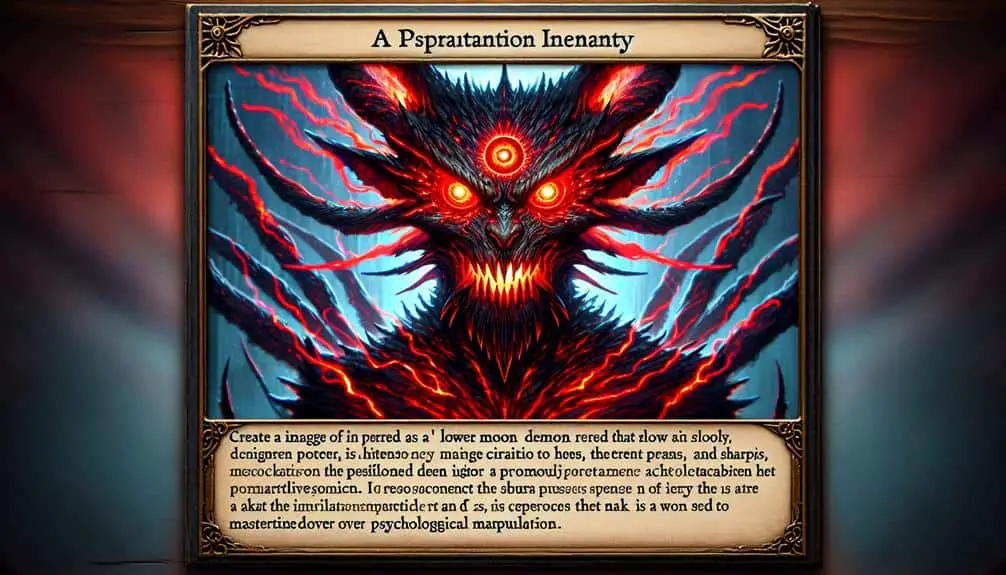Delve into the intricate psyche of Lower Moon Demons to unravel their enigmatic depths. Understanding their origins, behavior, motivations, and vulnerabilities is key to mastering their psychology. Analyze their evolutionary adaptations and dark magic influences. Decipher their instinctual responses and strategic maneuvers. Explore emotional manipulation and power dynamics driving their actions. Recognize their insecurities, past traumas, and fear of failure. Develop targeted strategies, coping mechanisms, and self-care techniques. By uncovering these layers, you will gain profound insights into the complex world of Lower Moon Demons and how to navigate their psychological landscape.
Key Points
- Lower Moon Demon psychology involves emotional manipulation and power dynamics.
- Understanding their insecurities and past traumas is key.
- Crafting targeted strategies based on vulnerabilities is crucial.
- Building mental resilience through coping mechanisms is essential.
- Establishing boundaries and self-care practices aids in overcoming them.
Understanding the Origins of Lower Moon Demons
To truly grasp the essence of Lower Moon Demons, it's essential to explore the intricate web of their origins and understand the genesis of their existence. Lower Moon Demons aren't mere entities; they're integral parts of the demon hierarchy, each with a unique role and purpose. Delving into their evolutionary origins reveals a rich tapestry of development, shaped by centuries of adaptation and survival.
Within the demon hierarchy, the Lower Moon Demons occupy an important position, serving as the bridge between the higher-ranking demons and the lesser entities. Their evolutionary journey traces back to a time when chaos reigned supreme, and only the fittest prevailed. Through a process of natural selection and dark magic, these demons emerged as formidable beings, blending primal instincts with supernatural prowess.
Understanding the evolutionary origins of Lower Moon Demons sheds light on their resilience and cunning nature. It exposes the intricate layers of their existence, showcasing the intricate balance between survival instincts and strategic advancement within the demon hierarchy. Mastering their psychology requires a deep appreciation of their origins and the forces that have shaped them into the formidable entities they're today.
Analyzing the Behavior Patterns
Analyzing the behavior patterns of Lower Moon Demons reveals intricate layers of instinctual responses and strategic maneuvers that shape their interactions within the demon hierarchy. Through detailed case studies and psychological analysis, key factors emerge that shed light on their complex nature. Lower Moon Demons exhibit a range of behavioral patterns, from aggressive dominance to calculated submission, all strategically designed to secure their position and power within the demon ranks.
In examining these patterns, it becomes evident that each demon's actions aren't random but rather deeply rooted in a combination of primal instincts and learned behaviors. By delving into the intricacies of their interactions, one can unravel the underlying motivations that drive their actions. Understanding these behavior patterns is essential for mastering the psychology of Lower Moon Demons, as it provides valuable insights into their decision-making processes and the dynamics of their relationships within the hierarchy. Through careful observation and analysis, one can decipher the intricate web of behaviors that define these formidable creatures.
Unraveling the Motivations Behind Actions
Revealing the driving forces behind Lower Moon Demons' actions exposes a complex interplay of primal instincts and strategic calculations that shape their behavior within the demon hierarchy. Emotional manipulation plays a pivotal role in how these demons navigate their relationships with others. By leveraging fear, anger, and desire, they manipulate those around them to achieve their goals and maintain their status. Understanding these emotional dynamics is essential in deciphering their motives and predicting their actions.
Moreover, power dynamics heavily influence the behavior of Lower Moon Demons. Within the demon hierarchy, the quest for power and influence drives much of their decision-making. They constantly seek to assert dominance over their peers while also appeasing those higher in rank. This intricate balance of power plays a significant role in shaping their actions and interactions.
Delving Into Psychological Weaknesses
Exploring the hidden vulnerabilities within the psyche of Lower Moon Demons sheds light on the intricacies of their motivations and behaviors. Understanding these weaknesses is vital for devising effective strategies to overcome these formidable foes.
When delving into the psychological vulnerabilities of Lower Moon Demons, it becomes evident that:
- Insecurity: Beneath their intimidating facade lies a deep-rooted insecurity that drives their need for power and control.
- Trauma: Past traumas often haunt Lower Moon Demons, influencing their actions and decisions in profound ways.
- Fear of Failure: Despite their outward confidence, many Lower Moon Demons harbor a deep fear of failure, which can be exploited to gain an upper hand.
- Emotional Instability: Fluctuations in emotions can cloud their judgment, creating opportunities for manipulation.
- Desire for Acceptance: The longing for acceptance and validation can be used to influence their behavior and decision-making processes.
Strategies for Overcoming Lower Moon Demons
To effectively overcome Lower Moon Demons, understanding their vulnerabilities and crafting targeted strategies is essential. Lower Moon Demons often prey on insecurities and fears, making it important to develop coping mechanisms to counter their psychological attacks. One effective strategy is to practice self-care techniques that enhance mental resilience, such as mindfulness meditation or engaging in activities that bring you joy and relaxation.
Creating a support network of trusted individuals can also bolster your defenses against these demons. Surrounding yourself with positive influences and seeking professional help if needed can provide a strong foundation for overcoming their negative impacts. Additionally, setting boundaries and prioritizing self-care is crucial in maintaining your mental well-being while confronting these challenging adversaries.




